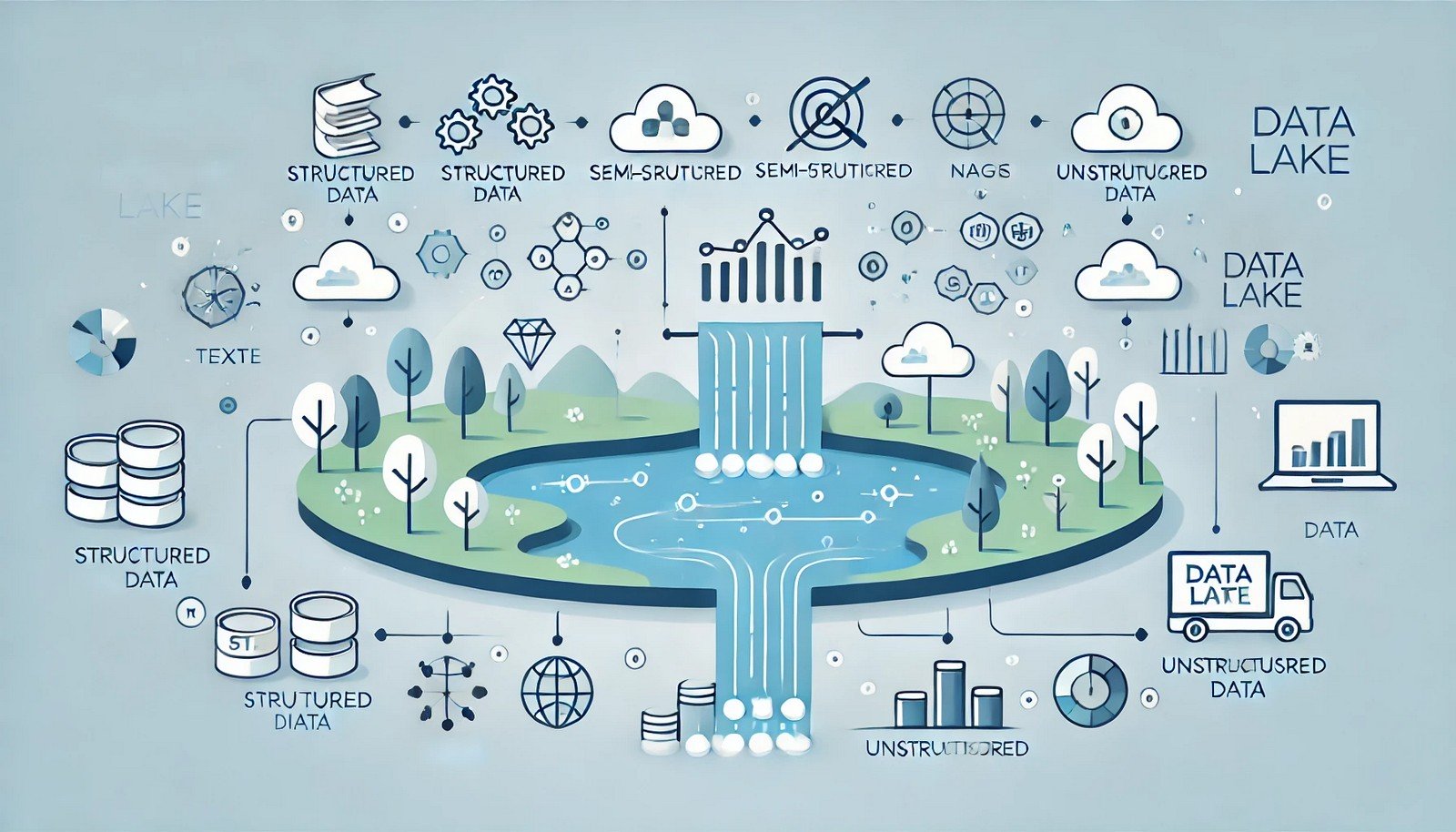Data Lake
 (Representational Image | Source: Dall-E)
(Representational Image | Source: Dall-E)
Quick Navigation:
- Data Lake Definition
- Data Lake Explained Easy
- Data Lake Origin
- Data Lake Etymology
- Data Lake Usage Trends
- Data Lake Usage
- Data Lake Examples in Context
- Data Lake FAQ
- Data Lake Related Words
Data Lake Definition
A data lake is a centralized repository that stores structured, semi-structured, and unstructured data at any scale. Unlike traditional databases, data lakes store data in its raw form until it is needed, making it an ideal solution for big data analytics. It supports a schema-on-read approach, meaning data is processed only when read. Data lakes are scalable, cost-effective, and integral for data-driven organizations looking to unlock insights through machine learning, predictive analytics, and business intelligence.
Data Lake Explained Easy
Think of a data lake as a giant toy box. You can throw all kinds of toys in it without organizing them first. Later, when you want to play, you can take out the toys and decide how to use them. Similarly, a data lake stores all types of data, and you only organize it when you need it.
Data Lake Origin
The concept of data lakes emerged as businesses started dealing with vast amounts of data generated from various sources. With the rise of big data in the early 2010s, data lakes became a solution for managing diverse datasets without rigid structures.
Data Lake Etymology
The term "data lake" originates from the metaphor of a lake where all water flows in and mixes, unlike "data warehouses," which are more structured like bottled water.
Data Lake Usage Trends
Data lakes are increasingly popular due to the surge in unstructured data, such as social media posts, IoT devices, and multimedia. Businesses leverage data lakes for advanced analytics, data science projects, and as a foundation for artificial intelligence initiatives.
Data Lake Usage
- Formal/Technical Tagging:
- Big Data
- Data Storage
- Cloud Computing - Typical Collocations:
- "Data lake architecture"
- "data ingestion in a data lake"
- "data lake vs data warehouse"
- "scaling a data lake"
Data Lake Examples in Context
- A healthcare company uses a data lake to store patient records, X-rays, and lab results for comprehensive analysis.
- E-commerce platforms store customer clickstreams in a data lake to optimize website design and product recommendations.
- Smart cities rely on data lakes to process real-time traffic patterns and energy usage data for urban planning.
Data Lake FAQ
- What is a data lake?
A data lake is a repository for storing vast amounts of raw data, allowing flexible data analysis. - How does a data lake differ from a data warehouse?
Data lakes store unstructured and semi-structured data, while data warehouses store structured, processed data. - What are the benefits of using a data lake?
Scalability, cost efficiency, and flexibility for data analytics and machine learning. - Can a data lake handle real-time data?
Yes, modern data lakes support real-time data ingestion and processing. - Are data lakes secure?
With proper governance and security measures, data lakes can be highly secure. - What challenges do data lakes face?
Challenges include data governance, duplication, and the risk of turning into a "data swamp" without organization. - Which industries use data lakes?
Healthcare, finance, e-commerce, and telecommunications are prominent users. - What is schema-on-read?
Schema-on-read allows data to be interpreted at the time of reading rather than when stored. - What is data lake architecture?
It includes components for ingestion, storage, security, and analytics. - Can data lakes integrate with cloud platforms?
Yes, many data lakes are built on cloud infrastructure for scalability.
Data Lake Related Words
- Categories/Topics:
- Big Data
- Cloud Storage
- Analytics
Did you know?
The term "data lake" was coined by James Dixon, CTO of Pentaho, to contrast it with structured data warehouses. Today, data lakes are a cornerstone of big data solutions.
PicDictionary.com is an online dictionary in pictures. If you have questions or suggestions, please reach out to us on WhatsApp or Twitter.Authors | Arjun Vishnu | @ArjunAndVishnu

I am Vishnu. I like AI, Linux, Single Board Computers, and Cloud Computing. I create the web & video content, and I also write for popular websites.
My younger brother, Arjun handles image & video editing. Together, we run a YouTube Channel that's focused on reviewing gadgets and explaining technology.



Comments powered by CComment